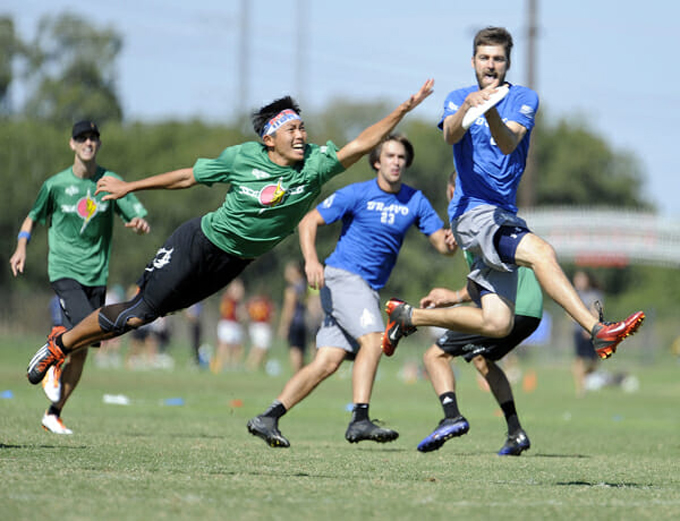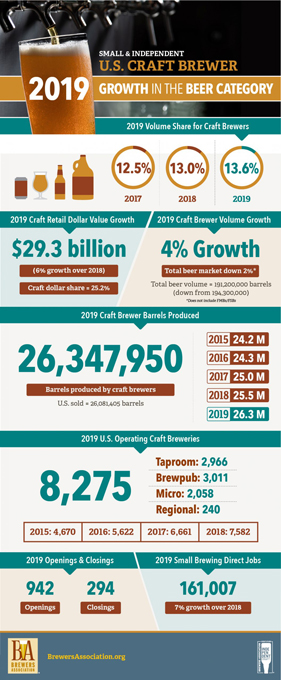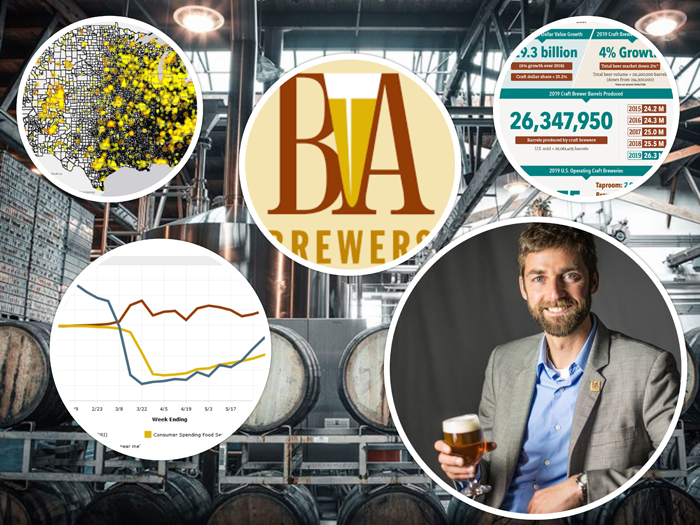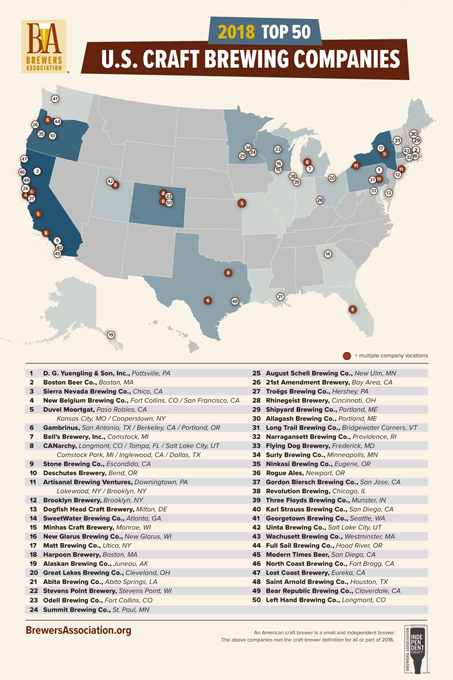Bart Watson – Brewers Association Chief Economist
Small and independent U.S. craft breweries have a powerful and fascinating story to tell about their impact to the U.S. economy and our social fabric. The story includes:
- generating significant taxable retail sales;
- creating numerous direct and indirect jobs;
- providing sustained growth to other complementary business areas such as agriculture and manufacturing;
- increasing city, county and state tourism;
- serving as a meeting place for family and friends; and
- contributing to the overall improvement of industrial and low-income areas.
Unfortunately the story has evolved this year to also include weathering the impacts of the COVID-19 pandemic.
Bart Watson, Brewers Association Chief Economist, helps bring this story alive by way of numbers. That’s right, Bart is a “numbers guy”. And through his work, small and independent U.S. craft breweries tell a compelling story to consumers, industry, news media, politicians and others. More importantly, the numbers make the story believable, relatable and often exciting.
For example, in 2018 Maine’s world-famous lobster industry contributed about $500M to the state’s economy. On the other hand, that same year Maine’s craft beer industry contributed more than $656M to the state’s economy. That’s the kind of number that grabs the attention of state legislature representatives when lobbying for changes to laws impacting small and independent craft breweries in Maine.
Bart Watson Up Close
Brewers Association Chief Economist
As the Chief Economist for the Brewers Association, a not-for-profit trade organization that protects and promotes small and independent U.S. brewers, Bart Watson is in charge of the Brewers Association’s statistical resources, including production surveys, economic analysis, and market research. In addition to providing industry data for members, his responsibilities include interacting with the media on economic and statistical issues.
Bart graciously took the time for an interview with me to share more about his background and the type of work he does (part 1 of this 2 part article). We also discussed some of his recent research and findings that are important to small and independent craft brewers, including the impact of COVID-19 (part 2 of this 2 part article).
Starting on a Different Path
In high school, Bart Watson started developing an interest in social and political sciences. Government and institutions intrigued Bart, so much so that he participated in model United Nations. Moreover, Bart’s interest had a quantitative inclination. So statistics were a natural way for him to further explore these sciences.
During his freshman year at Stanford University, Bart’s social and political science interest deepened. Bart commented, “One of the first classes I took in college was a freshman seminar on changes to the political economies of advanced democracies. We looked at comparisons between European countries and Japan and the United States. That really deepened my interest and desire to study those sciences.”
In addition, economics played a big role in Bart’s studies. Said Bart,” I took economics as well. It was a minor, not a major. But I took the full economics series in college….I’ve always studied economic topics but from a political science lens. So I was always interested in labor markets and business outcomes, etc.”
Settling in to a Life of Academia
At some point in time, Bart began to envision a life of academia in political science – teaching and conducting research. After obtaining a Bachelor of Arts Degree in Political Science from Stanford, Bart entered the graduate studies program at the University of California, Berkeley. Bart explained, “Once in grad school, that was a make or break moment on deciding if I was interested in studying the political economy for the rest of my life”…. “My grad area was both comparative politics and political economy….. My dissertation was on comparative retail trade and looking at how large retailers implemented technology in their businesses. That’s not a very “politics” topic but I looked at it in a way that a political scientist would to include examining the institutions and the rules that shape those things.”
Bart completed his PhD in Political Science at Berkeley and eventually wound up as a visiting Associate Professor at the University of Iowa.
It Wasn’t All Study
Political science and economics weren’t the only things in Bart Watson’s life. He’s a 10-time National/World Ultimate (Frisbee- like disc) champion between stints with Stanford University, Team USA and different club teams.
Frisbee may sound like it’s just a fun activity for the beach or parks. But Ultimate is a serious, highly competitive sport played by roughly 7 million men and women across 80 or so countries. Combining the non-stop movement and athletic endurance of soccer with the aerial passing skills of football, a game of Ultimate is played by two teams with a flying disc on a field with end zones, similar to football. Although a non-contact sport, the game is physical and challenging. And playing at the National or World level requires top athletes.
 Bart Watson catches the disc at the 2013 Club Championships. Photograph by CBMT Creative.
Bart Watson catches the disc at the 2013 Club Championships. Photograph by CBMT Creative.
Bart said, “I fell in love with the sport. I obviously had some level of natural talent. But I was mostly a soccer player before that…. It was a wonderful thing that I got to do for many years and grad school was a lot of work but you have a lot of flexibility so I was able to pursue my passion for Ultimate even as I got my PhD.”
Furthermore, craft beer and Ultimate have a somewhat symbiotic relationship, giving the expression “work hard, play hard” new meaning among these athletes. Some of the sports most popular cities are known as craft beer hot spots. In fact, a few craft breweries, like Seattle’s Georgetown Brewing, sponsor Ultimate teams. And Portland’s Breakside Brewing is actually named after a coined defensive move in Ultimate.
Hence, it should come as no surprise to find that Bart Watson became well acquainted with breweries in the San Francisco Bay area as well as other locations while working on his PhD studies and traveling to Ultimate games. Indeed, Bart’s Brewers Association Profile states “He holds a PhD from the University of California, Berkeley, where in addition to his dissertation, he completed a comprehensive survey of Bay Area brewpubs one pint at a time.”
A New Career – Brewers Association Chief Economist
In 2013, while working as a visiting professor at the University of Iowa, Bart came across the Brewers Association job. Bart elaborated, “I kind of applied as a lark. When you’re an adjunct professor you are very good at applying for things. So I applied for the Brewers Association job and got it. And I think it was a combination of being excited about the subject matter and not having a tenure track job yet…. Also, when I initially took the job I thought I would dip my toe in the water and I could always go back to academia if I didn’t like it. But I found a great job in the Brewers Association and a great industry in craft brewing. And I’ve really enjoyed moving on to the more applied side as opposed to the academic side as well.”
Bart’s position as the Brewers Association Chief Economist was new. Prior to the position, Bart’s boss handled some of the data collection responsibilities. However, the Chief Economist position was intended to not only handle the current data collection responsibilities, but to expand the association’s support to include conducting economic impact analyses; developing industry benchmarks; capturing and quantifying statistical data relevant to Federal/State laws and policies; creating a more comprehensive survey program that included consumers, suppliers and breweries; as well as, handling member requests for specific data needs. And since that time the responsibilities of Chief Economist have grown even more.
Some of the key insights provided by Bart Watson and the Brewers Association are available to members only and some are available to the general public. Certainly the National Beer Sales and Production Data report provides some of the most important data that the Brewers Association provides to its members and general public.
 2019 Growth in Craft Beer – graphic courtesy of the Brewers Association
2019 Growth in Craft Beer – graphic courtesy of the Brewers Association
Another highly sought report is the Brewers Association Top 50 Brewing Companies by Sales Volume. Many breweries measure themselves by this report. And there are certainly some bragging rights applied.
Did your favorite brewery make the top 50? – graphic courtesy of the Brewers Association
But a lot of Bart’s analysis activities are focused on day-to-day member requests. Bart illuminated, “For example, I just sent data to a member who is interested in the non-alcoholic beer market in the U.S. and New York and how that’s changed over time. Another example, I sent data to a request from a member who was interested in distributor consolidation in Pennsylvania. So, a real wide range of topics based on what our members need.”
A Compelling Small and Independent U.S. Craft Beer Story Told Through Numbers
As of 2019, small and independent U.S. craft beer is an $80B dollar industry in terms of economic impact. In addition, the industry contributes more than half a million jobs to the U.S. economy directly and indirectly. Through numbers like these and more, Bart Watson helps the industry tell their compelling story to consumers, industry, news media, politicians and others.
Said Bart, these numbers have “brought additional legitimacy to the industry. It’s helped tell that story. When you quantify the total impact of all these little breweries, it’s huge…. But it’s one piece among many in telling the story of the total industry. I won’t be so hubristic to say that the impact numbers are the biggest piece in that story…. But it has been one important piece of that larger puzzle.”


